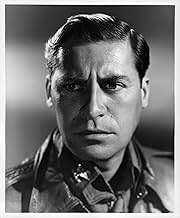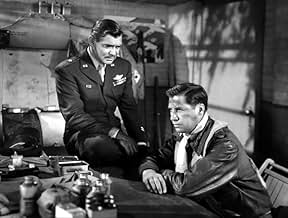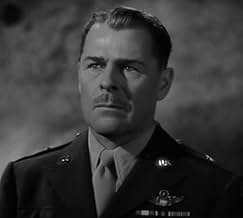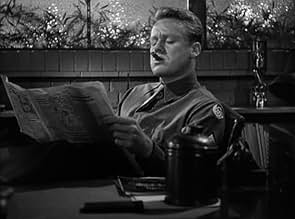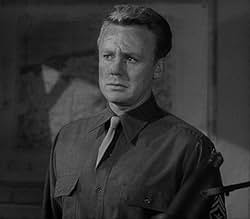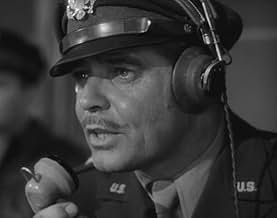ÉVALUATION IMDb
7,3/10
2,2 k
MA NOTE
Ajouter une intrigue dans votre langueArmy generals struggle with the decision to prioritize bombing the German factories producing new jet fighters over the extremely high casualties the mission will cost.Army generals struggle with the decision to prioritize bombing the German factories producing new jet fighters over the extremely high casualties the mission will cost.Army generals struggle with the decision to prioritize bombing the German factories producing new jet fighters over the extremely high casualties the mission will cost.
- Director
- Writers
- Stars
- Prix
- 3 victoires et 2 nominations au total
Avis en vedette
"Command Decision" is based on a stage play, so scenes of aerial combat are not to be found in the movie. This is a major difference between it and "Twelve O'clock High," released a year later in 1949, and which presented a more engaging, gritty, realistic motion picture of aerial combat and the toll it takes on the airmen and their support teams and commanders on the ground.
"Command Decision" tells a story of WWII air warfare from the point of view generals, politicians and the press, and the process of making a military decision in light of political consequences and public opinion. Clark Gable gives a great performance as General Casey, the officer who acts out of military necessity in choosing his targets, and in doing so, knows he puts the lives of his men and his friends on the line. Walter Pidgeon is General Kane, Gable's superior, who has lost some of his ability to look at his duty in purely military terms. Instead he perceives his mission is to fight the politicos and the press and to get the best spin on the actions of his command and commanders. Brian Donleavy is General Garnet, a relative newcomer to all of this. He is eager for his first command, but once on the scene at a combat headquarters, he begins to have doubts of his own about the mission, the politics and his own ability to send young men to their deaths.
The command decision in this fine, taut film is not one climatic decision, but is the story of a number of command decisions made by the three general officers, and how each effects and feeds off of the other men's command decisions throughout the film.
Good performances by all, a little melodramatic at times, but overall, one of the best war movies (especially about air warfare) you'll come across.
"Command Decision" tells a story of WWII air warfare from the point of view generals, politicians and the press, and the process of making a military decision in light of political consequences and public opinion. Clark Gable gives a great performance as General Casey, the officer who acts out of military necessity in choosing his targets, and in doing so, knows he puts the lives of his men and his friends on the line. Walter Pidgeon is General Kane, Gable's superior, who has lost some of his ability to look at his duty in purely military terms. Instead he perceives his mission is to fight the politicos and the press and to get the best spin on the actions of his command and commanders. Brian Donleavy is General Garnet, a relative newcomer to all of this. He is eager for his first command, but once on the scene at a combat headquarters, he begins to have doubts of his own about the mission, the politics and his own ability to send young men to their deaths.
The command decision in this fine, taut film is not one climatic decision, but is the story of a number of command decisions made by the three general officers, and how each effects and feeds off of the other men's command decisions throughout the film.
Good performances by all, a little melodramatic at times, but overall, one of the best war movies (especially about air warfare) you'll come across.
(There May Be Spoilers) Launching "Operation Stich" a week ahead of time, due to the favorable weather conditions over Germany, Brig. Gen. K.C Dennis', Clark Gable, B-17 Bombers suffer the loss of 48 aircraft on the first day's mission.
Going some 600 miles into Germany, without fighter escort, in a triangular bombardment of the key German industrial cities of Posenleben Schweinhafen and Fendelhorst. Gen. Dennis is determined to take them out Before the weather worsens and doesn't care how many planes and crews it costs him to do it.
The next days bombing of Schweinhafen cost another 24 B-17's. Due to German ingenuity in camouflaging the factories there the USAAF bombed the wrong city making it necessary to go on a bomb run the next day on the real Schweinhafen. By now the USAAF crews are at the point of refusing to go on their missions over Germany feeling that Gen.Dennis is out of his mind by sending then to certain death.
Gen. Dennis' superior and friend Maj. Gen. Kane, Walter Pigeon, is very upset with his actions and is about to relive him of his duties as combat-wing commander. Since Gen. Dennis launched his assault on Germany he lost some 70 bombers in two days compared to the loss of under 20 bombers lost by the RAF during the same period.
In a private meeting with Gen. Kane and other USAAF top personnel Gen. Dennis makes his case for the actions that he's taken even if it coast him his command of the B-17 combat-wing. The Germans are developing this revolutionary jet-fighter, the Lantze-Wolf. The Nazi Super-Plane is so superior to anything that the allies have that if it's manufactured in mass and put in the air the German Luftwaffe would drive the USAAF and RAF from the skies of Europe. It would make it impossible for a cross channel invasion of Europe the next year, 1944, and cost the allies the war.
Unable to open a second front in Western Europe and with the Luftwaffe having total air supremacy will force the allies, the USA UK and USSR, to agree to an armistice and peace treaty with the Germans on Hitler's terms. The bombing of those cities deep in Germany by Gen. Dennis' bombers will destroy the Germans ability to mass-produce the Lantez-Wolf. Thus save in the future countless American and Allied soldiers lives at the cost of the heavy, but necessary, losses in B-17 and their crews now.
This causes Gen. Kane to look the other way, knowing how right Gen. Dennis is, by allowing him to send his bombers out the next day and finally knock out the German industrial city of Schweinhafen. The bombing raid cost the life of Gen. Dennis best friend Col. Martin,John Hodiak. It's also in Schweinhafen where the jet-fighter is being assembled and in the end because of the heavy losses in that bombing raid Gen. Kane is forced, reluctantly, to relive Gen. Dennis of his command. US politicians like Congressman Arthur Malcolm, Edward Arnold, afraid of how the people back home feel about the staggering losses in the skies over Germany and Gen. Dennis' actions being responsible for them it's only a matter of time for him to be dismissed as a USAAF combat-wing commander.
The general took his dismissal with the same courage as his men took the murderous anti-aircraft fire and attacks of German fighters on the missions that he sent them on. Being replaced by his friend and fellow classmate at West Point Let. Gen. Clifton Garnet,Brian Donlevy.
Gen. Garnet also goes against the top brass, the next day, in ordering the bombing of Fendelhorst in central Germany to take out the last place where the deadly Lantze-Wolf are being made. With that, facing the same fate that Gen. Dennis just went through, ended up winning the war for the allies at the possible cost of his military career.
The truth is that like in the movie "Command Dicision" the Germans did develop a jet-fighter late in the war that if it was mass-produced and sent up against the allied air forces a year earlier would have won the Second World War for Germany. The German Masserschmitt Me-262 jet fighter could reach speeds of 540 to 580 MPH that was some 100 to 150 MPH faster then the swiftest USAAF and RAF fighters. In combat it scored as much as 700 combat kills over allied planes during 1944-1945. In their last major air to air engagement over Berlin in March 1945 some dozen Me-262's downed 25 B-17 and 5 fighter escorts to the loss of only two of their own.
Under 300 of the Me-262 jets put into combat and with, for the most part, them being flown by unexperienced pilots and with a shortage of jet fuel to keep the planes airborne for any long period of time. It turned out that the decision of USAAF generals like K.C Dennis to bomb the factories where the Me-262 were being made, despite the heavy allied air losses, that in the end won the war for the Allies in Europe.
Going some 600 miles into Germany, without fighter escort, in a triangular bombardment of the key German industrial cities of Posenleben Schweinhafen and Fendelhorst. Gen. Dennis is determined to take them out Before the weather worsens and doesn't care how many planes and crews it costs him to do it.
The next days bombing of Schweinhafen cost another 24 B-17's. Due to German ingenuity in camouflaging the factories there the USAAF bombed the wrong city making it necessary to go on a bomb run the next day on the real Schweinhafen. By now the USAAF crews are at the point of refusing to go on their missions over Germany feeling that Gen.Dennis is out of his mind by sending then to certain death.
Gen. Dennis' superior and friend Maj. Gen. Kane, Walter Pigeon, is very upset with his actions and is about to relive him of his duties as combat-wing commander. Since Gen. Dennis launched his assault on Germany he lost some 70 bombers in two days compared to the loss of under 20 bombers lost by the RAF during the same period.
In a private meeting with Gen. Kane and other USAAF top personnel Gen. Dennis makes his case for the actions that he's taken even if it coast him his command of the B-17 combat-wing. The Germans are developing this revolutionary jet-fighter, the Lantze-Wolf. The Nazi Super-Plane is so superior to anything that the allies have that if it's manufactured in mass and put in the air the German Luftwaffe would drive the USAAF and RAF from the skies of Europe. It would make it impossible for a cross channel invasion of Europe the next year, 1944, and cost the allies the war.
Unable to open a second front in Western Europe and with the Luftwaffe having total air supremacy will force the allies, the USA UK and USSR, to agree to an armistice and peace treaty with the Germans on Hitler's terms. The bombing of those cities deep in Germany by Gen. Dennis' bombers will destroy the Germans ability to mass-produce the Lantez-Wolf. Thus save in the future countless American and Allied soldiers lives at the cost of the heavy, but necessary, losses in B-17 and their crews now.
This causes Gen. Kane to look the other way, knowing how right Gen. Dennis is, by allowing him to send his bombers out the next day and finally knock out the German industrial city of Schweinhafen. The bombing raid cost the life of Gen. Dennis best friend Col. Martin,John Hodiak. It's also in Schweinhafen where the jet-fighter is being assembled and in the end because of the heavy losses in that bombing raid Gen. Kane is forced, reluctantly, to relive Gen. Dennis of his command. US politicians like Congressman Arthur Malcolm, Edward Arnold, afraid of how the people back home feel about the staggering losses in the skies over Germany and Gen. Dennis' actions being responsible for them it's only a matter of time for him to be dismissed as a USAAF combat-wing commander.
The general took his dismissal with the same courage as his men took the murderous anti-aircraft fire and attacks of German fighters on the missions that he sent them on. Being replaced by his friend and fellow classmate at West Point Let. Gen. Clifton Garnet,Brian Donlevy.
Gen. Garnet also goes against the top brass, the next day, in ordering the bombing of Fendelhorst in central Germany to take out the last place where the deadly Lantze-Wolf are being made. With that, facing the same fate that Gen. Dennis just went through, ended up winning the war for the allies at the possible cost of his military career.
The truth is that like in the movie "Command Dicision" the Germans did develop a jet-fighter late in the war that if it was mass-produced and sent up against the allied air forces a year earlier would have won the Second World War for Germany. The German Masserschmitt Me-262 jet fighter could reach speeds of 540 to 580 MPH that was some 100 to 150 MPH faster then the swiftest USAAF and RAF fighters. In combat it scored as much as 700 combat kills over allied planes during 1944-1945. In their last major air to air engagement over Berlin in March 1945 some dozen Me-262's downed 25 B-17 and 5 fighter escorts to the loss of only two of their own.
Under 300 of the Me-262 jets put into combat and with, for the most part, them being flown by unexperienced pilots and with a shortage of jet fuel to keep the planes airborne for any long period of time. It turned out that the decision of USAAF generals like K.C Dennis to bomb the factories where the Me-262 were being made, despite the heavy allied air losses, that in the end won the war for the Allies in Europe.
This is an under-appreciated gem of a move.
To start with, the core story sounds utterly fantastic, but it is partly true. There was never a "Lance-Wulf 190", but there really was a Messerschmidt Me-262 in World War 2. The Me-262 wasn't quite the wonder-plane which the mythical Lance-Wulf was, but it was a swept-wing jet with a top speed of 540 mph, a blinding speed for the time. And, as fighter pilots say, "speed is life".
American bombing in August, 1943 did delay the introduction of the real Me-262. (The pre-production aircraft were wrecked on an assembly line, forcing a delay of several months.) The irony is that the German jet fighter program was really stymied by Hitler's aversion to defensive weapons and the German feeling that the war could be won with existing fighter types.
There is, however, a "message" in this film which fully applies to civilian life. You know that everything is okay just now, but this will soon come to an end. Given those facts, are you willing to take some massive losses now and solve the problem? Or do you just wait for the situation to become visible to everyone before you act?
I don't know how many times I've seen people--even bright ones--opt for the "wait and see" course of action. It never works.
Just as Betty Davis's 1938 film "Jezebel" was overshadowed by "Gone With The Wind", this film was overshadowed by "Twelve O'Clock High".
To start with, the core story sounds utterly fantastic, but it is partly true. There was never a "Lance-Wulf 190", but there really was a Messerschmidt Me-262 in World War 2. The Me-262 wasn't quite the wonder-plane which the mythical Lance-Wulf was, but it was a swept-wing jet with a top speed of 540 mph, a blinding speed for the time. And, as fighter pilots say, "speed is life".
American bombing in August, 1943 did delay the introduction of the real Me-262. (The pre-production aircraft were wrecked on an assembly line, forcing a delay of several months.) The irony is that the German jet fighter program was really stymied by Hitler's aversion to defensive weapons and the German feeling that the war could be won with existing fighter types.
There is, however, a "message" in this film which fully applies to civilian life. You know that everything is okay just now, but this will soon come to an end. Given those facts, are you willing to take some massive losses now and solve the problem? Or do you just wait for the situation to become visible to everyone before you act?
I don't know how many times I've seen people--even bright ones--opt for the "wait and see" course of action. It never works.
Just as Betty Davis's 1938 film "Jezebel" was overshadowed by "Gone With The Wind", this film was overshadowed by "Twelve O'Clock High".
Just saw this on TCM. The story of generals fighting generals, press officers, politicians, etc. There's a few cliches, like the pilot who get news his wife has had a son gets killed during a mission. Don't expect Gable to give an over-the-top performance. It was originally a stage play -- so there are lots of one-on-one confrontations -- they are all done well.
There are no special effects, no women, no air battles. There's spliced in newsreel footage of a plane that lands and explodes. 1948 audiences couldn't really appreciate the abstraction of "air supremacy" that is the heart of the fight here. In our post-Gulf War post-Afghan War -- we now can appreciate the vision of men who took these risks -- so I'd say there's a special historical importance to this film. Check around the web for info on Gable's WW II service record -- he enlisted at age 41 into the Army Air Corps.
There are no special effects, no women, no air battles. There's spliced in newsreel footage of a plane that lands and explodes. 1948 audiences couldn't really appreciate the abstraction of "air supremacy" that is the heart of the fight here. In our post-Gulf War post-Afghan War -- we now can appreciate the vision of men who took these risks -- so I'd say there's a special historical importance to this film. Check around the web for info on Gable's WW II service record -- he enlisted at age 41 into the Army Air Corps.
There must be at least one whole generation of viewers who don't even know this film exists! Yet it remains one of the very best WWII films ever made. I first saw as a child, when it was quite new, and have seen it several times since. It has never lost its hold and that, I suppose, principally because of Clark Gable's superb performance (although the other parts are all very strongly done). It really must be one of his finest screen roles and that alone, one might think, would ensure that it is never long absent from television screens. Sadly it has been shown in Britain but once that I know of, and is not available here on a PAL-system video, although "Twelve O'Clock High" is available and often screened. In many ways the two films complement each other, each not wholly to be appreciated without seeing the other. "Twelve O'Clock High" has an almost exclusively military focus while "Command Decision" brings in the effect of political factors on military decisions. The latter film, however, has an edge: Gable on top form and that was always something very special.
Le saviez-vous
- AnecdotesClark Gable enlisted in the US Army Air Forces after his wife Carole Lombard died in a plane crash on a war bonds selling trip assisting the war effort. Gable went to Officers Candidate School (OCS), graduating as a second lieutenant, and was eventually promoted to major. He was trained as an aerial gunner and combat cameraman and was awarded both the Distinguished Flying Cross and Air Medal for at least five aerial bombing missions over Germany from England with the 351st Bomb Group (Heavy). Adolf Hitler personally offered a reward to the pilot or anti-aircraft gun crew who shot down Gable's plane.
- GaffesWhen General Dennis tries to talk down the bombardier flying the crippled bomber, the bombardier reports that the aircraft's fuel is exhausted. Presumably he had also dropped his bomb load over the target. His on-board supply of machine gun ammunition should be very low if not exhausted. Yet when the bomber crashes, it explodes and burns. If he has no bombs, no gas , and no machine gun ammunition, what's to burn?
- Citations
James Carwood: What's the answer, Brockie, all guts and no brain?
Elmer Brockhurst: No. That's putting it too simply. Dennis is one of those boys whose brain is fascinated by guts. He loves this lousy war.
- Autres versionsAlso available in a computer colorized version.
- ConnexionsFeatured in Clark Gable: Tall, Dark and Handsome (1996)
Meilleurs choix
Connectez-vous pour évaluer et surveiller les recommandations personnalisées
- How long is Command Decision?Propulsé par Alexa
Détails
Box-office
- Budget
- 2 467 000 $ US (estimation)
- Durée1 heure 52 minutes
- Couleur
- Rapport de forme
- 1.37 : 1
Contribuer à cette page
Suggérer une modification ou ajouter du contenu manquant

Lacune principale
By what name was Command Decision (1948) officially released in India in English?
Répondre

